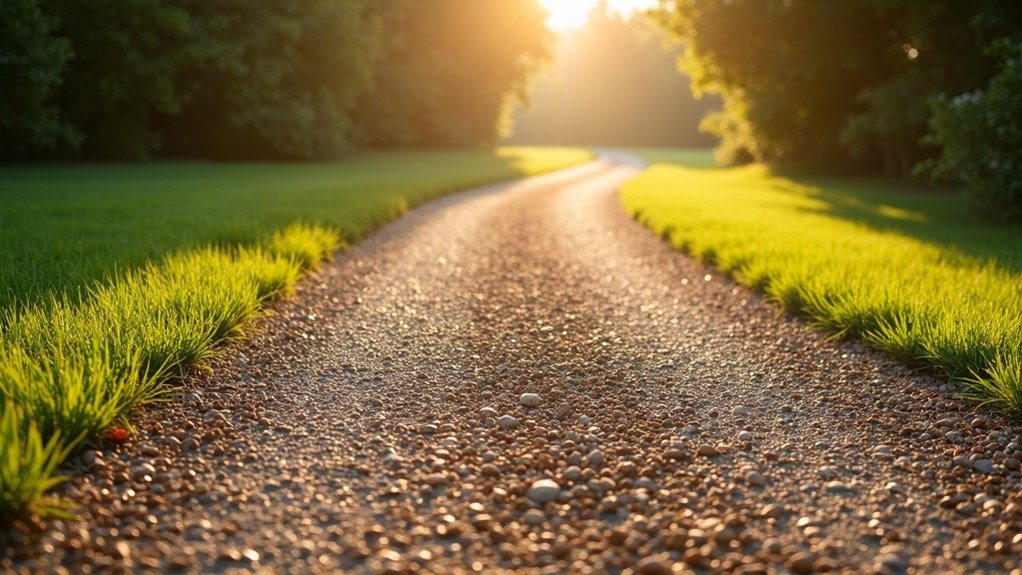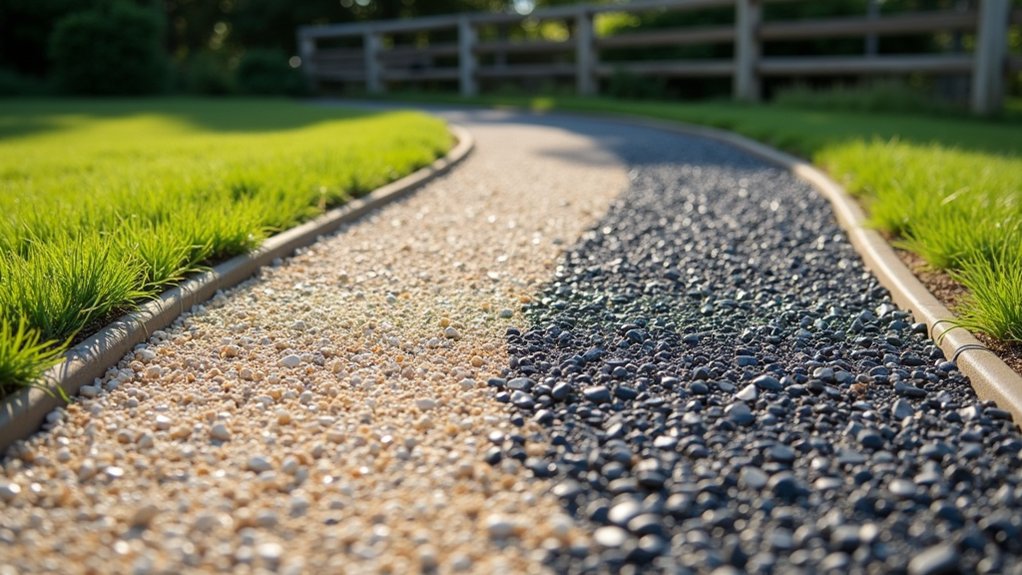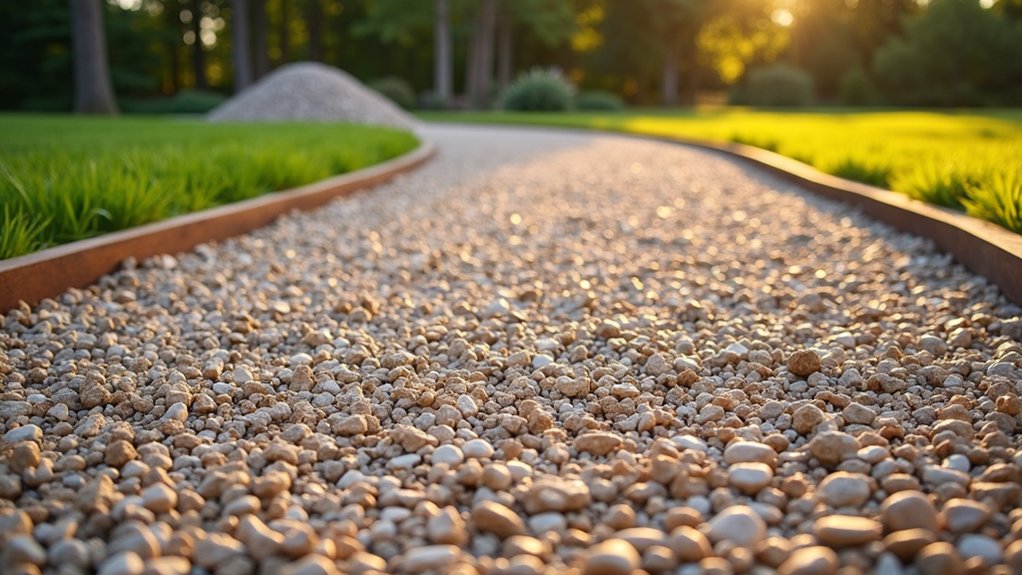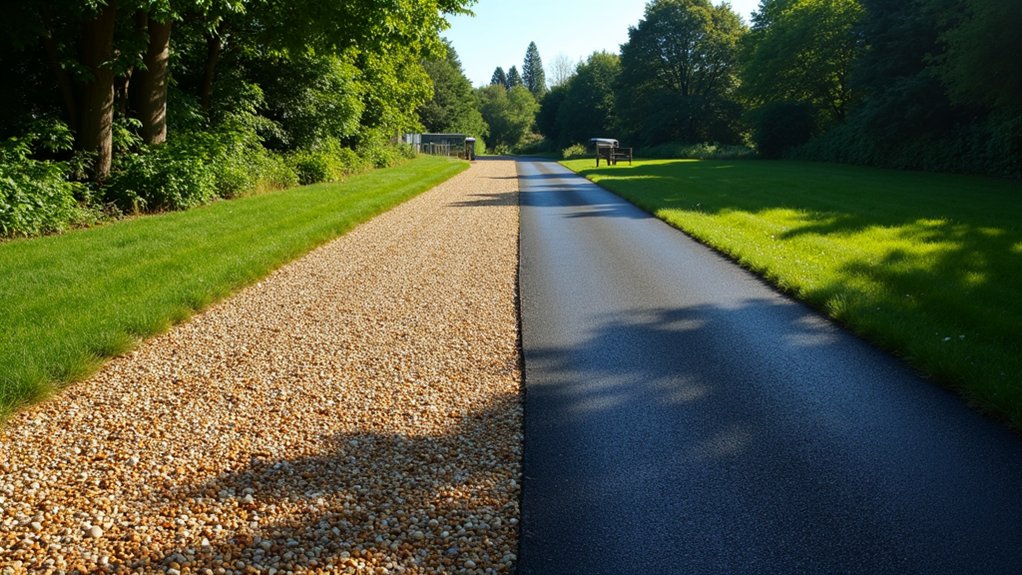To keep your gravel driveway dust-free, start by selecting the right gravel mix, preferably between 20mm and 25mm for better stability. Consider using chloride-based dust suppressants like calcium chloride, which help to attract moisture and reduce dust levels. Additionally, implementing soil stabilisers can be beneficial, and it’s crucial to water your driveway effectively – do this during cooler periods to minimise evaporation. Regular maintenance is key; ensure you replenish the gravel as needed and check that the surface remains smooth. These simple strategies will help improve both the performance and appearance of your driveway.
Table of Contents
ToggleKey Takeaways
- Use chemical dust suppressants like calcium chloride to attract moisture and effectively reduce dust.
- Opt for a well-graded gravel mix, ideally between 20mm and 25mm, to ensure stability and control dust.
- Regularly water the driveway during the early morning or late evening to minimise evaporation and keep it moist.
- Apply soil stabilisers or dust suppressants after grading to improve compaction and maintain a dust-free surface.
- Plant native vegetation and install windbreak shrubs to stabilise the soil and limit dust spread in the area.
Understanding Dust Control Methods for Gravel Driveways
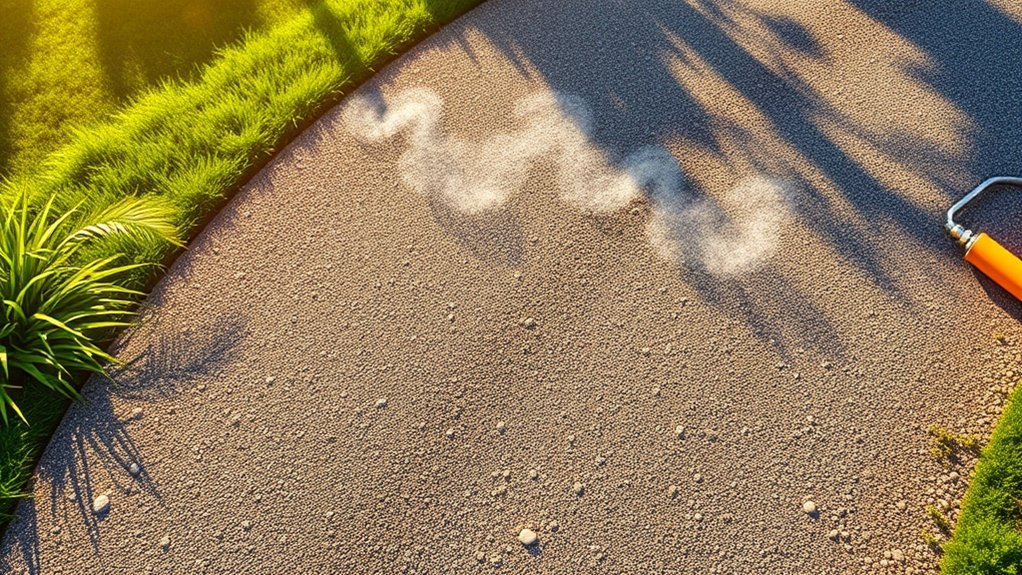
Managing dust on gravel driveways is essential for keeping the surface clean and stable. Chemical dust suppressants like calcium chloride and magnesium chloride are effective options. These hygroscopic agents attract moisture from the air, keeping the gravel damp and significantly reducing dust for weeks after application. They can be applied using sprayer trucks or handheld spreaders for an even finish. Dust forms when loose soil or dirt particles escape from the ground surface, contributing to the need for effective control measures. For a quick fix, regular watering can help control dust but requires frequent effort. Additionally, soil adhesives and stabilisers, such as Ground Glue®, help bind gravel particles together, improving stability and minimising dust. Combining these methods often provides the best results for maintaining your gravel driveway.
Choosing the Right Gravel Mix
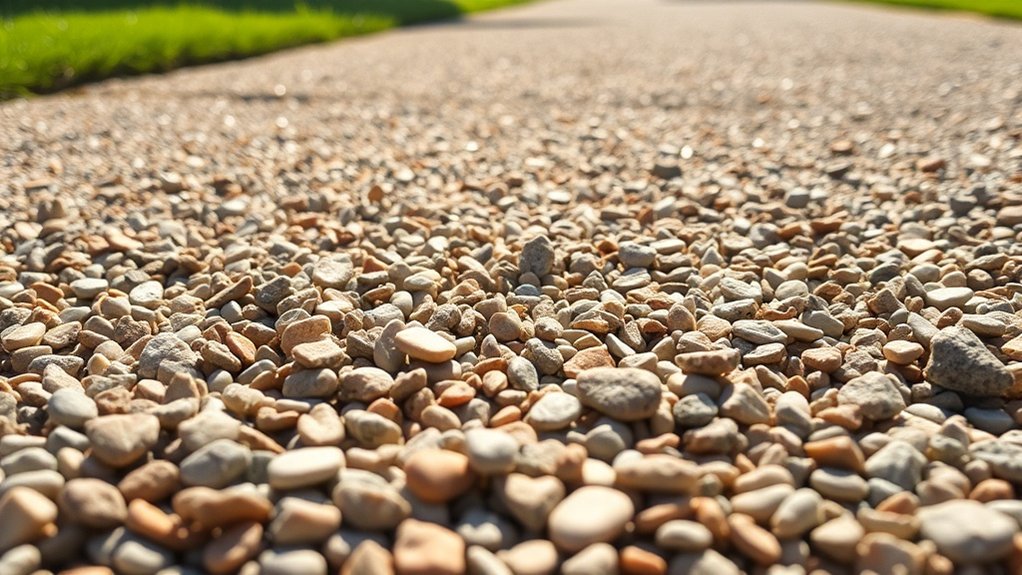
When selecting the right gravel mix for your driveway, focus on aggregate size and quality. Choose coarser materials that interlock well, as these reduce dust and improve stability. It’s also wise to consider dust control features, like a balanced mix of fines and robust rock types, to ensure your driveway lasts. Additionally, incorporating dust control products like calcium chloride or magnesium chloride can significantly enhance the longevity and effectiveness of your dust suppression efforts.
Aggregate Size Importance
Choosing the right gravel mix for your driveway is crucial for stability and longevity. Aim for gravel sizes between 20mm and 25mm, as this range allows for optimal compaction and load distribution. Smaller sizes, under 6mm, can become unstable under the weight of vehicles, while larger gravel lacks the necessary interlock, leading to a loose surface. A well-graded mix, combining both larger stones and finer particles, improves compaction by filling gaps and reducing dust. Additionally, using #57s gravel is recommended for its effectiveness in creating a compact and durable surface. This mix also supports effective drainage, preventing water pooling and erosion. By selecting the correct aggregate size, you ensure a durable, dust-free driveway that can withstand both time and traffic.
Quality Gravel Selection
Selecting the right gravel mix is crucial for the performance and longevity of your driveway. Keep in mind the following gravel selection criteria, including composition and colour, to help minimise dust.
| Gravel Type | Benefits | Considerations |
|---|---|---|
| Crushed Stone | Excellent compaction, good drainage | Requires more maintenance |
| Quarry Process | Strong compaction, stable surface | Can be more expensive |
| Crushed Limestone | Durable, well-draining | Wears down faster in colder climates |
| Marble Chips | Attractive, durable | Higher cost, prone to dirt build-up |
Opt for a mix that includes fines to improve compaction and reduce dust. Lighter gravels reflect heat better, which can help lower dust levels. Make sure your gravel type is suitable for your local climate to ensure optimal performance.
Dust Control Features
To effectively manage dust on your gravel driveway, it’s important to consider specific dust control features in your gravel mix.
Here are three key aspects:
- Gravel Size Distribution: A well-balanced mix of aggregate sizes helps with compaction, which reduces dust. Aim for 5-15% fines to bind the particles together and minimise airborne dust without leaving too much loose material.
- Dust Suppressant Additives: Use hygroscopic compounds like calcium chloride. These absorb moisture and keep the surface damp, making your gravel treatments more effective.
- Stabilising Agents: Incorporate soil stabilisers or geosynthetics to bond the particles and prevent them from being displaced, which can extend the lifespan of your driveway.
The Role of Chloride-Based Dust Suppressants
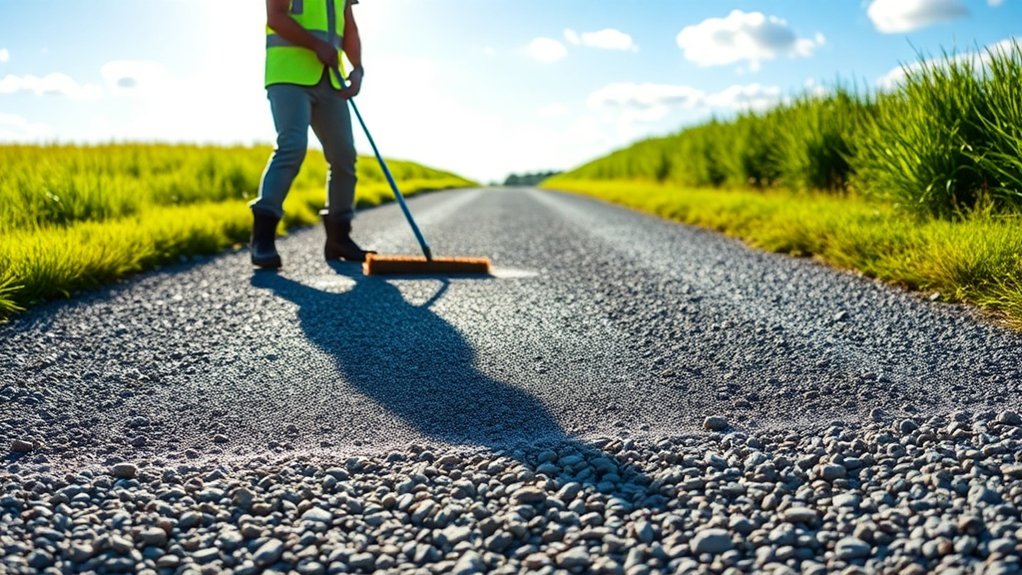
When considering chloride-based dust suppressants like calcium chloride for your gravel driveway, you’ll find they effectively attract moisture and reduce dust.
To apply these suppressants correctly, you’ll need specific equipment, such as a calibrated sprayer, to ensure even coverage.
Knowing the benefits and application requirements will help you develop an efficient dust control strategy for your driveway.
Calcium Chloride Benefits
Calcium chloride (CaCl₂) is an excellent dust suppressant, thanks to its ability to attract moisture from the air. This keeps surfaces damp, effectively binding fine dust particles.
Here are three key benefits of using calcium chloride:
- Long-lasting Moisture Retention: It holds onto moisture far better than water, ensuring effective dust control even in dry conditions.
- Enhanced Road Stability: By compacting and interlocking aggregates, it creates a more robust road surface, potentially cutting maintenance needs by around 50%.
- Cost Savings: With less frequent need for re-gravelling and upkeep, calcium chloride can save both time and money while delivering reliable dust control.
Using calcium chloride for your gravel driveway can significantly improve its performance and longevity.
Application Equipment Requirements
To effectively apply chloride-based dust suppressants, you need specialised equipment that ensures even distribution over gravel surfaces.
Ensure your equipment is compatible with chloride solutions, specifically designed for 30-35% magnesium or calcium chloride concentrations. It’s crucial to have precise control over application rates, measured in gallons per square yard or mile, to optimise product use and prolong its effectiveness.
Regular maintenance is vital—check spray nozzles and tanks to avoid clogging.
Choose corrosion-resistant tanks made from materials like polyethylene or stainless steel, as chloride can be harsh on equipment. Agitation features are also important to keep the solution evenly mixed during transport.
Implementing Soil Stabilizers and Binders
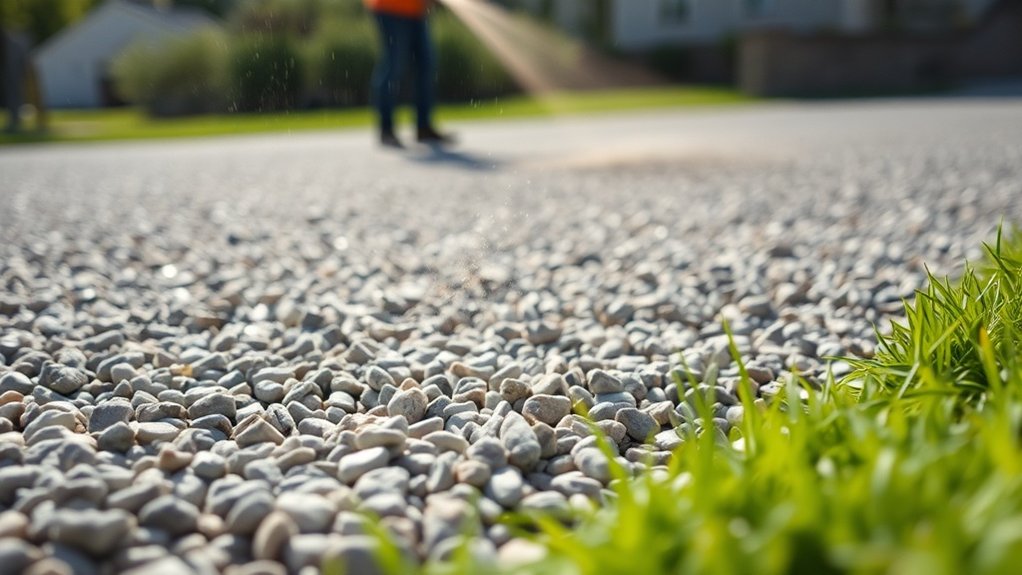
To create a dust-free gravel driveway, using soil stabilisers and binders is essential for maintaining surface integrity and minimising airborne dust. Here are three effective options:
- Organic stabilisers: These natural compounds, such as lignin or tree sap, bind soil particles and are environmentally friendly.
- Enzymatic stabilisers: These bind soil particles, particularly clay, to form a durable, concrete-like surface that significantly reduces dust.
- Polymer emulsions: While more expensive, these create a hard film on the surface, effectively trapping dust.
When applying these stabilisers, ensure the conditions are right—warm temperatures improve absorption.
Regular reapplications are necessary, especially after heavy rain or high traffic, to maintain effective dust control over time.
The Benefits of Paving and Surface Sealing
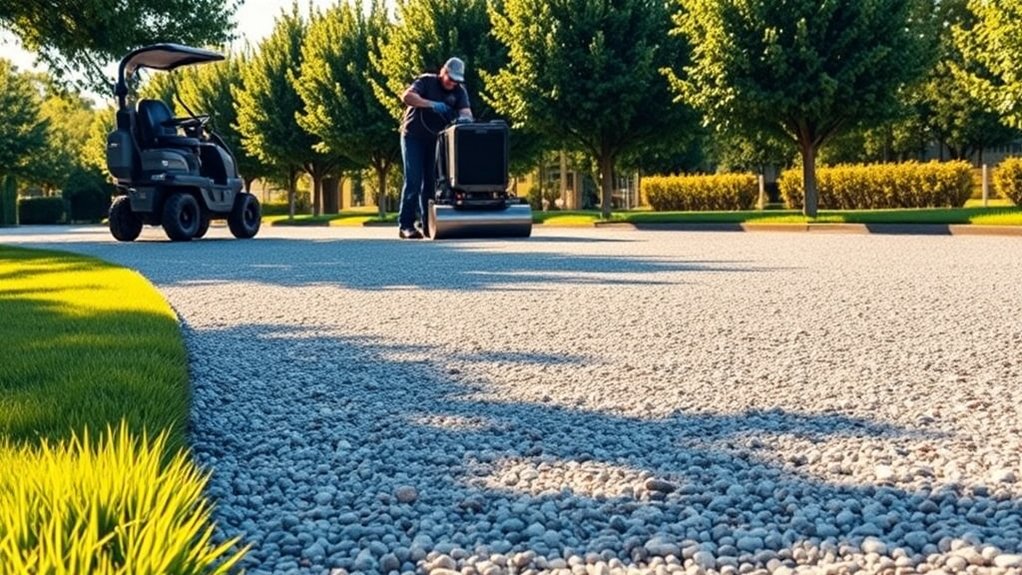
While gravel driveways may have a quaint charm, paving and surface sealing offer substantial benefits that improve both durability and functionality. Techniques such as chip sealing create a robust surface that withstands wear and tear while still looking attractive. Surface sealing provides protection against environmental damage and spills, prolonging the lifespan of your driveway and lowering maintenance costs. Additionally, resin driveways offer unique design options and excellent weather resistance, enhancing both aesthetics and practicality.
| Benefit | Description |
|---|---|
| Durability | Shields against UV rays, water, and chemicals |
| Aesthetic Appeal | Maintains colour and a fresh appearance |
| Cost-Effectiveness | Minimises repair needs, saving money in the long run |
Sealing every 2-5 years ensures optimal protection, preserving stability and enhancing your property’s value.
Utilizing Vegetation and Ground Cover
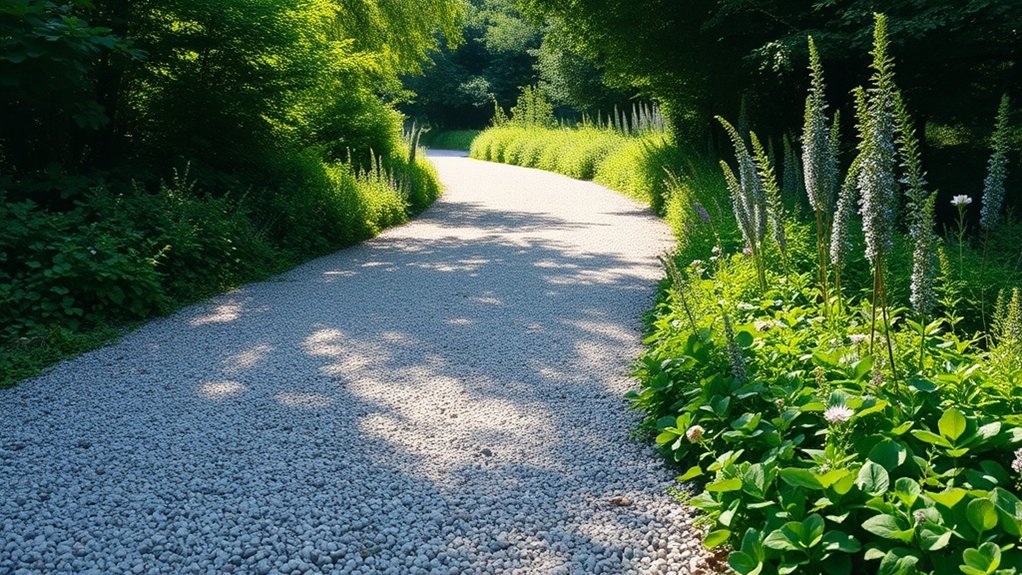
Incorporating vegetation and ground cover into your gravel driveway design not only boosts its appearance but also helps minimise dust.
Here are three effective options to consider:
- Low-growing ground covers: These stabilise the soil without hindering driveway access.
- Dense-rooted grasses: They enhance soil structure, binding gravel and reducing dust.
- Windbreak shrubs: Plant these along the edges to lower wind speed and limit dust spread.
Effective Water Application Techniques
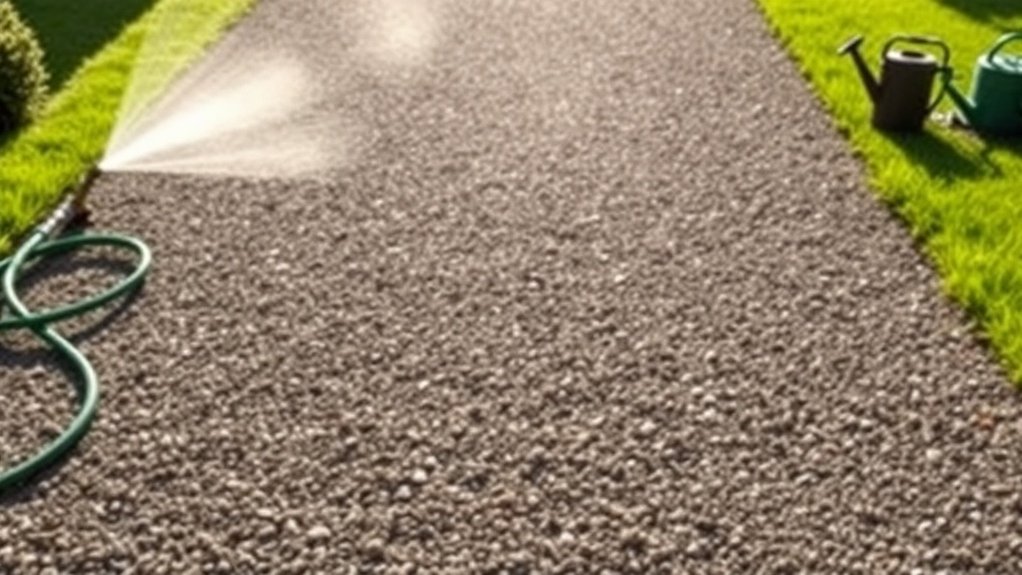
Effective water application techniques are vital for keeping your gravel driveway free from dust.
To optimise water distribution, water early in the morning or late in the evening to reduce evaporation. Use spray nozzles or low-pressure systems for even coverage and to prevent runoff. Aim to moisten the top layer to a depth of about 0.25 inches, ensuring complete coverage to avoid dry patches.
Adding binding agents can help retain moisture, and compacting the surface can lock in water. Regularly check for dry spots and adjust your watering frequency according to the weather.
Proper water application helps prevent erosion while maintaining a dust-free driveway.
Regular Maintenance and Replenishment
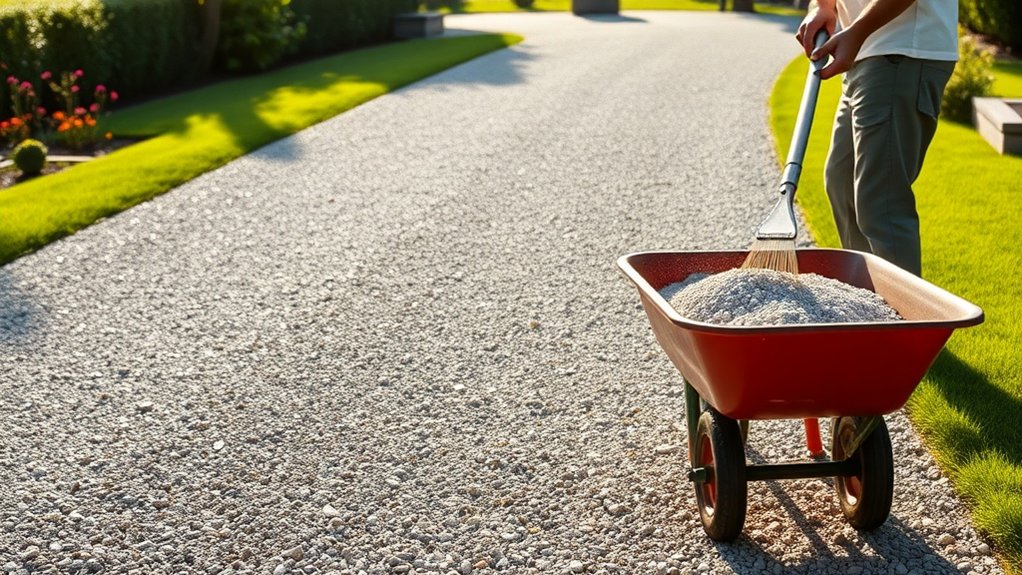
To keep your gravel driveway dust-free, regular maintenance and replenishment are essential. A well-planned schedule enhances the longevity of the gravel and minimises dust.
Here are three key practices:
- Regular Inspections and Grading: Check your driveway often for areas that need grading. A smooth surface reduces loose gravel and dust.
- Replenishing Quality Gravel: Add clean, high-quality gravel every few months. Using a well-mixed aggregate helps prevent it from breaking down into dust and ensures a stable surface.
- Application of Binding Agents: After grading, consider using soil stabilisers or dust suppressants. These products improve gravel durability and significantly cut down on dust.
Combining Strategies for Optimal Results
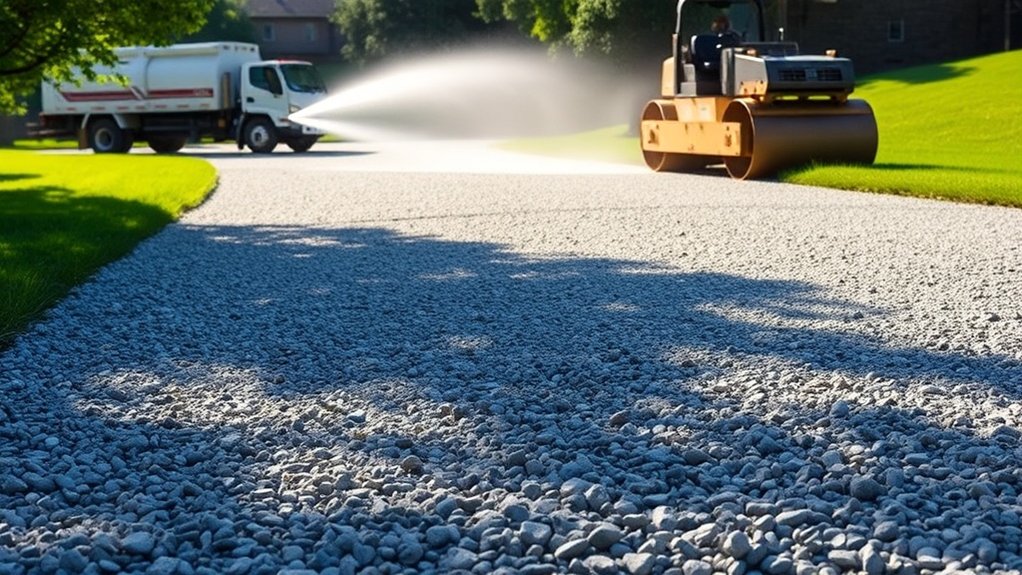
Combining various dust control methods can significantly improve the performance of your gravel driveway.
Start with chemical dust suppressants like magnesium chloride, which attract moisture and effectively reduce dust. Next, use soil stabilisers to bind gravel particles, enhancing durability and minimising dust.
Incorporate moisture retention strategies by adding high-quality gravel with the right gradation to keep the surface damp. For long-term solutions, consider surface coverings like asphalt or chip seal, which create a barrier against dust.
Lastly, plant native vegetation to stabilise the soil and further reduce airborne dust. By integrating these techniques, you’ll achieve a more effective and resilient gravel driveway.
Frequently Asked Questions
How Often Should I Reapply Chloride-Based Dust Suppressants?
Chloride dust suppressants should be reapplied every 100 to 150 days, depending on traffic levels and weather conditions. Keep an eye on dust levels and the surface to ensure effective dust control. For instance, if you have a busy road or it’s particularly dry, you might need to reapply more frequently.
Can I Use Recycled Materials for My Gravel Mix?
Yes, you can use recycled materials in your gravel mix. They provide a sustainable option and improve the durability of the material, creating a stable base for your driveway. Plus, they can help reduce costs and lessen environmental impact, making them a smart choice.
What Are the Environmental Impacts of Dust Suppressants?
Over 70% of chemical dust suppressants harm environmental health. It’s wise to explore biodegradable alternatives to minimise toxicity, safeguard ecosystems, and reduce harmful runoff. This approach promotes sustainable dust control practices.
How Do I Know if My Gravel Needs Replenishing?
Regularly check the depth of your gravel in line with your maintenance schedule. If you spot bare patches, potholes, or uneven areas, it’s a sign that replenishing is needed. Ongoing drainage problems or difficulty navigating with vehicles also suggest it’s time to refresh your gravel.
Are There Any Local Regulations for Dust Control Methods?
Check local regulations regarding dust control methods, as they can differ significantly. Compliance usually requires adhering to specific treatment types, application methods, and monitoring to ensure environmental protection and community safety. For instance, construction sites may need to use water sprays or dust suppressants to minimise airborne particles. Plan accordingly to meet these requirements.
Conclusion
By using these dust control methods, you can create a nearly dust-free gravel driveway. Start by selecting the right gravel mix and applying dust suppressants to minimise airborne particles. Regular maintenance is also key. Additionally, incorporating vegetation not only improves the look of your driveway but helps with natural dust control. With a bit of effort, you’ll have a driveway that’s smooth and clean, benefiting both your home and vehicles. Begin today for long-lasting results!
Keen to enhance your driveway with the right gravel? Discover the best types and find out which one suits your Read more
How to enhance your gravel driveway's stability and durability? Discover key strategies that can transform your drive into a long-lasting Read more
Uncover the essential differences between gravel driveways and tarmac, and find out which option truly suits your needs best.

